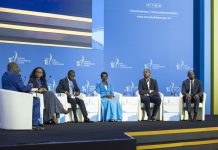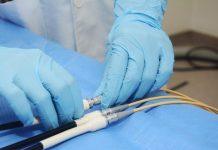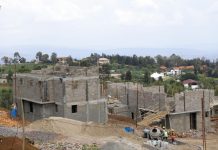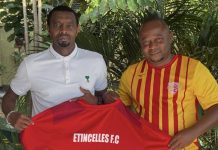Africa-Press – Rwanda. Diane Mukasahaha, founder and CEO of the textile company DIKAM Ltd, runs a business that began as a small home workshop teaching a handful of women to sew and has since grown into a thriving enterprise employing hundreds and earning recognition beyond Rwanda.
Based in Kimironko, Gasabo District, DIKAM Ltd was last week named among the top 10 finalists of the 2025 Africa’s Business Heroes (ABH) Prize Competition, an initiative by Alibaba Philanthropy and the Jack Ma Foundation.
Selected from nearly 32,000 applicants across the continent, Mukasahaha is the first Rwandan entrepreneur to reach the top 10 of the competition in 2025.
The grand finale will be held in Kigali on December 12–13, with US$1.5 million in grants to be awarded. The overall winner will receive US$300,000, while each finalist is guaranteed at least US$100,000, along with mentorship, access to global networks, and opportunities to showcase their ventures.
Mukasahaha first learned about the competition on the Rwanda Development Board (RDB) website and seized the opportunity.
“It’s such a big platform, with people competing from all over Africa. Out of 32,000 applicants from 54 countries, I was honestly surprised. Making it to the top 50 already felt like a huge achievement,” she said.
Following multiple interviews, due diligence checks, and pitches, she advanced to the top 20 and was invited to Dakar, Senegal, for a live pitch before judges.
“The competition was really intense, with entrepreneurs from Nigeria, Kenya, Egypt, South Africa, and other countries showcasing amazing businesses. It was tough, but going through our finances and operations made it worthwhile. I now understand every part of how our company runs.”
From health to business
Mukasahaha’s journey into entrepreneurship is rooted in her 15 years in public health. She worked with organisations such as the US Embassy, USAID, and most recently, the Rwanda Biomedical Center (RBC) as national coordinator of palliative care.
She advocated for pain-control medication and support for terminally ill patients, witnessing how poverty limited access to treatment.
“I realised that while policies exist, funding for palliative care is often dependent on donations. I asked myself, what if I could create something that generates income and gives back?”
The idea for DIKAM Ltd was born in 2012, inspired by her desire to support women, especially young mothers, and improve their working conditions. She recalled seeing women hawking food while carrying babies on their backs and worrying about health risks for both.
“I knew I had to start something small to support women, to allow babies to move, eat on time, and let their mothers work comfortably,” she said.
She began informally at her home in Gisozi in 2017, training two women using old sewing machines. One was from Gakingiro market, earning less than Rwf 500 a day.
Soon, she brought in more women and hired a trainer. Inspired by the Made in Rwanda drive, she formalised the business.
DIKAM Ltd was officially registered in June 2018 and later relocated to Gakingiro, Gisozi, to access tax benefits and expand operations.
Growth path
The company initially employed 30 part-time staff, all paid through bank accounts. During the COVID-19 recovery period, DIKAM scaled up, hiring more workers and purchasing machines in batches.
Today, it employs about 280 permanent staff, with 120 casual workers supporting production. The company also mentors eight small firms and provides practical guidance to young entrepreneurs.
DIKAM specialises in uniforms for hospitals, security companies, and hotels, accounting for 60% of output, with the rest going to general clothing and sportswear.
The company has also ventured into exports, supplying Italian sportswear brand Givova jackets to markets in Germany and the Netherlands.
Challenges and opportunities
Mukasahaha said convincing local clients to embrace Rwandan-made products and sourcing raw materials internationally remains a hurdle. Meeting growing demand is also a challenge. Still, she views these obstacles as opportunities to demonstrate that African women can run large industrial ventures.
She is piloting a local fabric manufacturing line using cotton from Uganda and Tanzania, aiming for 100% Made in Rwanda or East African fabrics to reduce imports.
“Africa exports raw cotton and imports finished fabric at triple the price. We are changing that narrative,” she said.
Inspiration and mentorship
Mukasahaha sees entrepreneurship as a pathway for women’s empowerment, challenging stereotypes about fragility.
Diane Mukasahaha, founder and CEO of the textile company DIKAM Ltd during the interview with The New Times. Photos by Titus Manzi
“If we can raise five children in Rwanda, we can run big factories. Beauty with brains is not just a slogan, it’s about delivering impact,” she noted.
She credits her mother—who went to university at 62 and raised both biological and adopted children—for instilling determination. She also draws inspiration from President Paul Kagame’s resilience and from Indra Nooyi, former PepsiCo CEO, for balancing leadership and family life.
Every Friday, Mukasahaha mentors young women and staff on mindset, empowerment, and financial skills. Through a staff savings scheme, employees can borrow small loans to support side businesses and repay later, creating a cycle of growth.
Her long-term goal is for DIKAM to expand across Africa and beyond. “When I started, my goal was to create 5,000 jobs, and I keep adding more. I want African women to be counted among the continent’s most impactful leaders.”
Winning the ABH competition, she said, would accelerate plans for a large-scale fabric factory with advanced machinery and environmentally friendly facilities.
“Whether we win or not, we will do it. The prize will simply help us reach our target more quickly.”
She praised Rwanda’s supportive business environment, citing efficient procurement, market access, and women’s business clusters under the Private Sector Federation.
Beyond business
Away from work, Mukasahaha is a mother of four, a wife, and a lover of music and family life. She enjoys attending church and listening to music. She credits her husband’s quiet but steadfast support for much of her success.
Her academic background includes a bachelor’s degree in nursing, a master’s in public health from the University of Manchester, and a diploma in palliative care from France.
For her, the ABH platform is not just a competition but an opportunity to showcase the potential of African women and inspire others. “Women don’t need to wait for opportunities—they must create, produce, and innovate,” she said.
Selected from nearly 32,000 applicants across the continent, Mukasahaha is the first Rwandan entrepreneur to reach the top 10 of the competition.
DIKAM Ltd was last week named among the top 10 finalists of the 2025 Africa’s Business Heroes (ABH) Prize Competition
For More News And Analysis About Rwanda Follow Africa-Press















